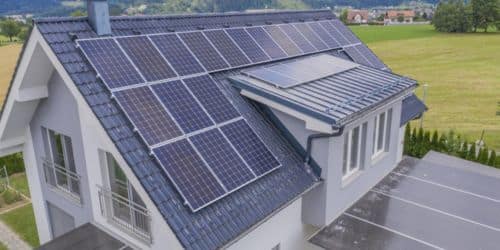As a business owner, I know you’re facing a lot of challenges when it comes to sustainability. Rising energy costs are eating into your bottom line. You want to be environmentally responsible but still stay profitable. It’s a tricky balancing act, for sure.
But what if I told you there’s a solution that can help you reduce costs, go green, and future-proof your business? Enter solar energy. Installing solar panels on your commercial property is a strategic shift that delivers major benefits for years to come.
Stick with me as I break it down for you in simple, relatable terms. My goal is to explain solar energy’s upside as a smart business investment so you feel empowered to make the best choice. Let’s dive in!
The Business Case for Solar Energy
First, let’s talk about money, since that’s the biggest business benefit. Put simply, solar energy can save you a boatload in operating costs. How? Those shiny new solar panels on your roof will lower your electricity bills big time, says Smart Solar Energy. We’re talking 25-75% lower, depending on your energy usage. You’ll pay little to nothing for that portion of power.
That means more money in your pocket and predictable overhead costs when it comes to utilities. No more budget-busting monthly power bills! You’ll also be protected from painful utility rate hikes. While grid energy prices continue to rise, your solar-generated power rates will stay consistent for 20+ years. That stability is massive for your company’s financial forecasting and cash flow management.
On top of all that, federal and local solar incentives can seriously cut costs too. The 26% federal Investment Tax Credit (ITC) can refund you nearly a third of total solar installation costs. And state or city solar rebates can drive that price even lower. The bottom line: you keep more revenue.
But wait, there’s more! Going solar boosts your property value; homes with solar energy systems sell for about 4% more than ones without. Plus, renewable energy like this helps your business stand out. You’ll get major points for corporate social responsibility from customers who care about sustainability.
Lastly, solar energy gives you energy independence and reduces risk. With your own power source, you don’t have to worry about grid outages. Talk about reliability! And if disaster strikes, you’ll have backup electricity to keep essential operations running. That security is invaluable these days.
Clearly, the numbers show solar power is a smart business decision all around. You’ll maximize profits for years to come!
Solar Technology 101
I know what you may be thinking—how the heck does solar energy work to cut my electric bill? Great question. Let me break down the tech in simple terms.
There are two main types of solar energy systems out there. The first is called solar photovoltaics. This is what most people think of: panels on your roof with solar cells to soak up the sun’s rays. The rays activate electrons, which generate electric current we can use to power things!
PV systems are typically connected to the grid so you can pull from both energy sources. The excess solar power you produce goes back into the grid and lowers your bill; that’s called net metering. You can also use PV panels off-grid if you add batteries to store power. Off-grid is a great option for remote locations.
The second type is solar thermal technology. This harnesses the sun’s heat energy instead of light energy. Solar thermal systems use panels to collect heat to warm up water or air. That thermal energy can heat water for your building, provide space heating, or even run air conditioning systems!
Any solar system needs a few other components to function:
- Inverters – These nifty devices convert the solar DC current into usable AC current for your business.
- Batteries – Storing extra solar energy in batteries gives you backup reserves for when the sun’s not shining.
- Monitoring – These smart systems track solar production so you can optimize efficiency and savings!
Several factors influence solar power efficiency:
- Panel types: monocrystalline silicon panels have the highest efficiency rating (15–22%).
- Positioning: The optimal panel tilt and sun-facing direction vary by location.
- Shading – Nearby structures or trees can block the sunlight and reduce output.
It’s amazing how this clean energy source can efficiently power your business with just the technology of solar cells and the power of the sun!
Doing the Solar Financial Math
Alright, here comes the fun part: crunching the numbers! As with any business investment, you’ll want to analyze the costs, available financing, payback period, and return on investment (ROI) for a solar installation.
Let’s start with the basics: what will this cost? Solar energy system costs depend on your property size, energy usage, and the types and numbers of components needed. On average, solar panel system costs range from $15,000 – $25,000. Additional installation and maintenance expenses add to that total too.
Of course, that’s a hefty upfront price tag. But don’t worry; you’ve got options to finance solar. Most businesses choose loans, leasing, or power purchase agreements to cover system costs over time. The electricity savings typically offset the loan or lease payments.
Generally, the payback period for solar is 6–10 years; that’s how long it takes to recoup your capital investment through energy savings. And solar panels can keep efficiently generating electricity for 25–30 years. So you’ll get continued returns on investment for decades after paying off the system!
One more tip: work with a solar provider that offers production forecasting. Their projections will give you accurate data to determine your exact ROI timeline, optimize savings, and make an informed business decision.
Planning Your Solar Installation
Alright, you’ve done the solar math and decided it’s time to move forward. What does the process look like to install these bad boys? Let me walk you through the key steps.
First, you’ll need a site evaluation. A solar technician will assess your roof’s condition, structural capacity, and any shading or obstructions. This ensures your property can support solar panels and maximize sunshine exposure.
Next comes permitting and interconnection with your utility company. Local jurisdictions require permits and inspections to connect a solar energy system to the grid. Thankfully, streamlined online solar permitting is now available in many areas to simplify things.
Now it’s time to pick the perfect solar vendor. Get quotes from at least 3 top-rated local installers. Compare costs, credentials, certifications, reviews, equipment brands, warranties, and monitoring services. Choose a provider you trust to get the job done right.
Installation day is here! Skilled solar technicians will mount and wire the solar racks, modules, inverters and other components on your roof or ground area. The physical installation is usually completed in one day.
After installation, your local building department will inspect everything to make sure it’s compliant with electrical codes and safety standards. Once approved, the utility company will swap your meter to a bi-directional net meter for seamless grid interconnection.
Over the years, occasional maintenance like solar panel cleaning and inverter checks will keep your system humming along at max efficiency. Don’t forget to monitor performance data and production levels too – this helps optimize solar savings over time.
And that’s the process in a nutshell! With an expert solar installer guiding you, the switch to solar energy is actually pretty straightforward.
The Solar-Powered Future is Bright
Solar technology keeps getting better and cheaper every year. Efficiency is rising while component costs are declining. Solar energy is projected to grow by 2400 gigawatts till 2027. Widespread adoption is accelerating to combat climate change and meet renewable energy targets.
Advances in battery storage also show promise for those times when the sun’s not out. Soon enough, affordable batteries will let businesses tap into solar reserves 24/7 and operate 100% off the grid. The future is solar + storage!
I don’t know about you, but I’m choosing to be on the right side of history. The sustainability benefits of solar energy are just too vital to pass up. And the technology has proven itself as a real game changer for commercial business operations.
The Bottom Line
Let’s review the key points. Installing solar panels will seriously lower your electric bills, protect against rising energy costs, earn tax credits and rebates, boost your property value, enhance sustainability credentials, and provide energy independence.
Clearly, solar energy gives you a competitive edge with lower operating expenses, enhanced reputation, and risk mitigation from grid outages. It’s a smart long-term play for your bottom line.
The innovative technology and attractive incentives make going solar a no-brainer. I encourage you to seize control over your energy future! Evaluate your options and make the switch to clean, renewable solar power. Your business and the planet will thank you.
Here comes the sun – and a brighter, more sustainable future awaits. Are you ready to harness the power?






